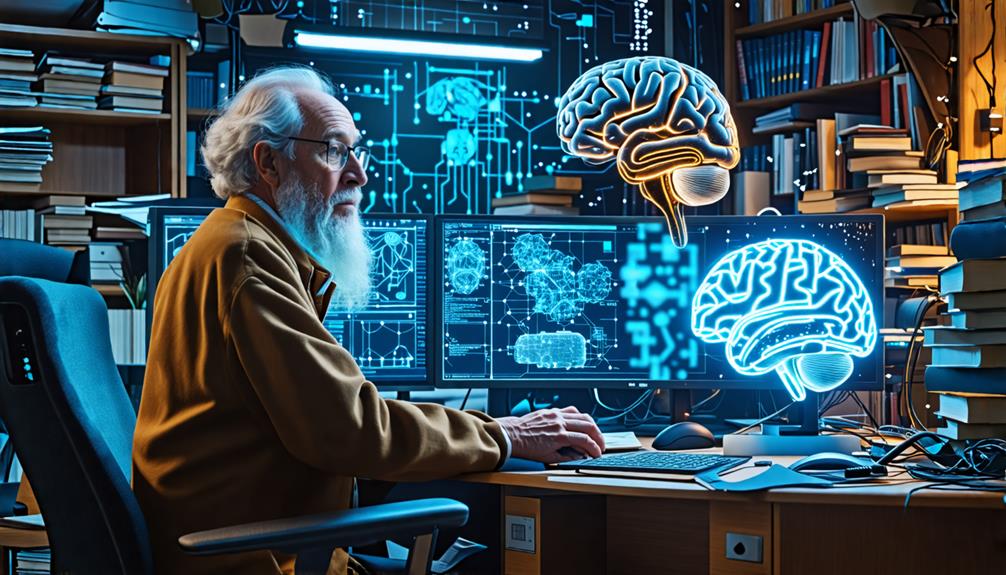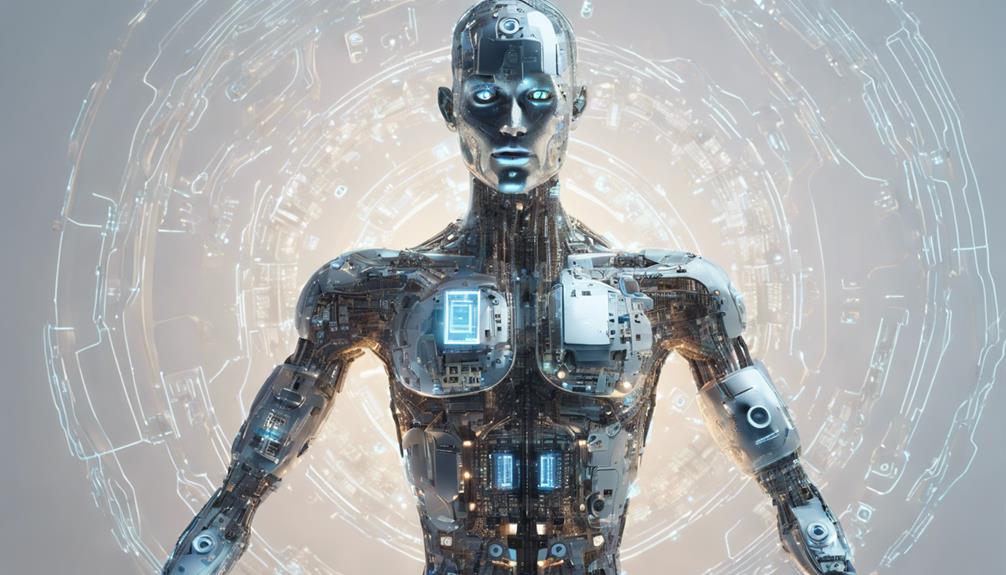
John McCarthy, born in Boston in 1927, is known as the father of artificial intelligence. You can see his influence in today's tech, as he coined the term "artificial intelligence" in 1956 and founded the revolutionary AI concepts at the Dartmouth Conference. He also created the Lisp language, which laid the groundwork for modern AI development. His work has been vital in shaping technologies that mimic human decision-making processes. McCarthy's vision for AI was grounded in the belief that machines could independently reason and learn. His contributions continue to impact innovations and the ethical landscape of AI. There's a lot to explore about how his legacy continues to influence technology today.
Early Life of John McCarthy

Born on September 4, 1927, in Boston, Massachusetts, John McCarthy emerged as a pioneering figure in artificial intelligence. Growing up, you'd find him engrossed in books, a habit spurred by his father, an Irish immigrant, and his Lithuanian Jewish mother, both ardent communists. His love for mathematics blossomed early, and by the age of 14, he'd taught himself calculus.
Despite his parents' political leanings, McCarthy's focus remained steadfast on his burgeoning interest in science and mathematics. After moving to Los Angeles with his family, he finished high school two years early. You'd probably imagine him rushing off to a prestigious university next, but World War II had other plans. He enrolled at Caltech, but soon after, he was drafted into the US Army. However, his stint in the military didn't last long; he returned to Caltech post-war, diving deeper into mathematics.
John's academic journey didn't stop there; he transferred to Princeton University. There, he not only completed his Ph.D. but also began to form the theoretical foundations that would later catapult him into the limelight of artificial intelligence.
This period set the stage for his lifelong dedication to developing the technology that thinks.
The Birth of AI Concept
John McCarthy coined the term 'artificial intelligence' in 1956, marking the official beginning of the AI concept. You might wonder why that year was pivotal. It was during this time that McCarthy, along with other brilliant minds, began to see patterns and potential where others saw only numbers and machines. They envisioned a future where machines wouldn't just calculate but think, adapting and learning from their interactions.
Imagine being at the Dartmouth Conference, where McCarthy first introduced this revolutionary idea. You'd see the excitement in the air as scholars and scientists debated and dreamed of the possibilities. It wasn't just about creating something new; it was about transforming everything known about computation and automation.
This concept didn't emerge in a vacuum. It was the result of a rich tapestry of advancements in mathematics, logic, and computer technology.
You're now standing at the threshold of this new era, glimpsing into a future driven by intelligent machines. This isn't just a scientific evolution; it's a paradigm shift in how you interact with technology, shaping your daily life and your understanding of potential.
Step into this new world, where intelligence isn't bound by biological limits.
Key Contributions to AI

Now let's explore the pivotal contributions that have shaped the field of artificial intelligence.
You've probably heard of the Turing Test, developed by Alan Turing, which evaluates a machine's ability to exhibit intelligent behavior equivalent to, or indistinguishable from, that of a human. This concept has driven AI research into developing systems that can deceive and interact just like humans.
Moving forward, you can't overlook the impact of machine learning algorithms. These algorithms allow computers to learn from and make decisions based on data. You've seen this in action with applications like speech recognition, recommendation systems, and self-driving cars, which adapt and improve based on experience without being explicitly programmed.
Deep learning, a subset of machine learning, deserves a special mention. It involves neural networks with many layers that mimic the human brain. This approach has been fundamental in advancing computer vision and natural language processing. You interact with these technologies daily when you use voice-activated assistants or when Facebook tags photos automatically.
These innovations aren't just technical feats; they're transforming how you live and work, making processes more efficient and paving the way for advancements in numerous fields.
Development of Lisp Language
In the midst of AI's evolution, the Lisp language emerged as a pivotal tool for programming advanced computational processes. You've likely heard of it as a favorite among AI researchers, and there's a good reason. Developed in the late 1950s, Lisp's ability to process symbolic information rapidly set it apart from other programming languages. Its structure, heavily reliant on expressions and recursion, made it uniquely suited for the iterative nature of AI problem-solving.
You might find it fascinating that Lisp introduced many programming concepts, such as trees, automatic storage management, dynamic typing, and the self-hosting compiler, which have influenced numerous other languages. Its flexibility allows you to manipulate the source code as a data structure, giving you exceptional control over the programming process itself.
This adaptability was vital for AI development, as it facilitated rapid prototyping and experimentation. Lisp wasn't just a tool; it was a revolution in thought about how languages could be structured to think, learn, and evolve with the programmer.
As you dive deeper into AI's history, you'll see just how critical Lisp was in providing the foundational tools that propelled the field forward.
McCarthy's AI Philosophies

Delving into McCarthy's AI philosophies reveals his belief that machines can, indeed, simulate any aspect of human intelligence. He argued that not only can machines perform tasks, but they can also embody the cognitive faculties that typify human thought. You might find it fascinating that McCarthy saw no fundamental difference between human minds and artificial machines in terms of processing information and making decisions.
He famously proposed the concept of machines making decisions based on conditional statements, much like humans do with 'if-then' reasoning. This idea underscores his belief in the potential for AI to tackle complex, real-world problems by following logical, programmed guidelines. It's essential to grasp that for McCarthy, the goal wasn't to mimic human behavior superficially but to develop systems that could reason, learn, and make decisions independently.
McCarthy's vision extended to the ethical implications of AI. He pondered the consequences of autonomous machines and their interaction with society, anticipating debates on AI ethics that you're likely familiar with today. His foresight into these issues reflects his deep understanding of both the technical and societal dimensions of AI development.
Pioneering the AI Lab
John McCarthy's establishment of the AI Lab marked a monumental step in the journey toward advanced artificial intelligence systems. Imagine stepping into a space where the boundaries of technology and imagination blur, where the seeds of modern AI were first planted and nurtured. That's what McCarthy's lab was like.
You might wonder, what made this lab so special? It wasn't just a room filled with computers and eager scientists; it was a breeding ground for ideas that would shape the future. Here, experimentation wasn't just encouraged; it was mandatory. The AI Lab became a magnet for brilliant minds who shared a common goal of exploring the potential of artificial intelligence.
McCarthy's vision was clear. He didn't just want to make machines smarter; he aimed to integrate them seamlessly into society to enhance human capabilities. By founding this lab, he provided the essential tools and environment necessary for these pioneering explorations.
As you delve deeper into the workings of the AI Lab, you find that it wasn't just about the technology. It was about challenging the status quo, pushing the envelope, and daring to dream about what AI could become. This was where the foundation of our AI-driven future began.
Legacy in AI Innovation

McCarthy's legacy in AI innovation has profoundly shaped how technology interacts with our daily lives. You rely on AI every day, often without realizing it. From the moment you wake up, AI algorithms suggest your news, control your smart home devices, and optimize your route to work.
McCarthy's vision of machines that can reason has transformed into practical tools that manage complex data and automate decisions. His early work laid the groundwork for what you now recognize as machine learning and natural language processing. Every time you ask a voice assistant to play your favorite song or to give you the weather forecast, you're interacting with systems that grew from his foundational concepts. These technologies learn from vast amounts of data, making them smarter and more intuitive, just as McCarthy predicted.
Moreover, his idea of an 'advice taker' has evolved into sophisticated recommendation systems that influence what you buy, watch, and even whom you date. The e-commerce suggestions and streaming service playlists that seem tailor-made for you? They're direct descendants of McCarthy's pioneering ideas.
McCarthy's influence goes beyond daily conveniences; it's integral to advancements in health care, finance, and even autonomous driving. His innovative spirit continues to push the boundaries of what AI can accomplish in your life.
Awards and Recognitions
How has John McCarthy's groundbreaking work in AI been recognized in the scientific community and beyond?
You'll find that his contributions haven't only shaped the field but have also earned him prestigious accolades. Among these, the Turing Award, often described as the 'Nobel Prize of Computing,' stands out. He received this honor in 1971 for his influential work in AI, which includes founding the discipline, coining the term 'Artificial Intelligence,' and developing the Lisp programming language.
Beyond the Turing Award, McCarthy's excellence was recognized with the National Medal of Science, awarded in 1990. This decoration highlighted his role in the development of computer science and AI. Additionally, he was a fellow of multiple esteemed organizations, including the American Association for Artificial Intelligence and the American Academy of Arts and Sciences.
His recognitions reflect a career dedicated to pioneering ideas that propelled the understanding and capabilities of AI.
These honors not only underscore his seminal contributions but also demonstrate the broad and lasting impact of his work on both academia and the public perception of artificial intelligence.
Impact on Modern Technology

Reflecting on John McCarthy's accolades, it's clear that his innovations have significantly shaped modern technology. You're experiencing his impact as you swipe through your smartphone, interact with smart home devices, or marvel at the capabilities of autonomous vehicles.
McCarthy's development of artificial intelligence concepts has paved the way for technologies that understand, predict, and react to human behavior.
You mightn't realize it, but every time you ask Siri for directions or receive product recommendations from Amazon, you're benefiting from algorithms that can trace their lineage back to McCarthy's early AI research. His foresight in the 1950s and 60s spawned industries now booming with advancements that seemed like science fiction during his time.
Moreover, the programming languages you hear about, like Lisp, which McCarthy invented, have allowed for complex problem-solving in technology development, making what you use today more intuitive and responsive.
It's not just about making your life easier; these technologies also drive innovation in sectors like healthcare, where AI assists in diagnosing diseases faster and more accurately than ever before.
Understanding McCarthy's contributions gives you a window into how deeply AI is woven into the fabric of modern technology, influencing how you live, work, and interact with the world around you.
Frequently Asked Questions
How Did Mccarthy's Personal Beliefs Influence His AI Research?
You're looking at how personal beliefs shaped AI research. McCarthy's views on human cognition deeply influenced his work, leading to pioneering concepts in artificial intelligence that emphasized logic and reasoning processes in machines.
What Were Mccarthy's Views on AI Ethics and Safety?
You're exploring McCarthy's views on AI ethics and safety, which highlight his foresight into potential risks and the need for responsible AI development to prevent unintended consequences and ensure machines align with human values.
Did Mccarthy Have Any Notable Mentors or Inspirations?
You're curious about influences in AI, right? John McCarthy was notably inspired by mathematician Claude Shannon and computing pioneer Alan Turing, both of whom shaped his seminal views on artificial intelligence development.
How Did Mccarthy's Work Influence Current AI Policies?
You'll find McCarthy's early AI concepts deeply embedded in today's policies, shaping regulations and ethical standards that guide the development and implementation of artificial intelligence across various industries and governmental frameworks.
What Challenges Did Mccarthy Face During His Early Research?
You'd find that during his early research, McCarthy faced limited technology, skepticism from peers, and funding shortages, all of which made pioneering AI's foundational theories and practical applications a formidable challenge.
Conclusion
You've now seen how John McCarthy, often hailed as the father of AI, shaped the future with his groundbreaking ideas and innovations.
From developing Lisp to pioneering AI labs, McCarthy's work not only garnered prestigious awards but also profoundly influenced modern technology.
His legacy continues to inspire and drive the evolution of AI, proving that his visionary contributions were just the beginning of what AI can achieve in transforming our world.






